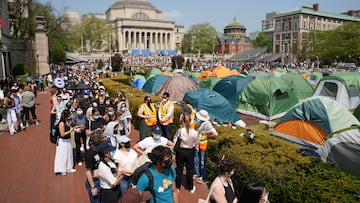Trump threatens to revoke visas for international students who protest
Trump has floated the idea of revoking visas for international students who engage in protests, but for some, this is already a reality.

On the campaign trail, President-elect Donald Trump lashed out against students protesting Israel’s war on Gaza, which a growing number of academics and international organizations call a genocide. At the Republican National Convention, the party proposed deporting protesters deemed “radical” and focused on those who participated in Pro-Palestinian protests.
Policies limiting the expressive freedoms of international students could greatly impact their experience. In light of increasing threats, organizations like the Association of International Educators (NAFSA) are encouraging universities to prepare guidance on the possible legal consequences of engaging in protests.
The long history of student protests
Students have often been at the forefront of political movements, not only in the United States but also around the world. From civil rights to the anti-war movement, students pushed the United States in a more progressive direction, and at every turn, they were called extremists, radicals, and un-American. Donald Trump’s threats against international students echo these slanderous campaigns of the past. For many on the right, international students who come to study in the country are not meant to voice their opposition to the government’s decisions, even when their families are on the receiving end of those policies.
Instead, some members of the GOP would like to see gratitude from students who are granted the opportunity to study in the U.S. This view often ignores the fact that the prestige of the country’s higher education system attracts some of the world’s most talented students and the country shares in their success and benefits from the education they receive.
The case of Momodou Taal at Cornell University
Since then, the speech has set off alarm bells for thousands of foreign students who have taken advantage of the expressive freedoms enshrined in the US Constitution.
🚨🚨 MIT is effectively expelling PhD student Prahlad Iyengar for Palestine activism on campus. 🚨🚨
— MIT Coalition Against Apartheid (@mit_caa) December 8, 2024
EMERGENCY RALLY: Cambridge City Hall, Monday, 12/9 at 5:30pm. Org sign-on to letter: https://t.co/tCOrOLTeNy pic.twitter.com/7cAYrvn5ad
Among the most famous cases is Momodou Taal, a student from The Gambia who was pursuing a PhD in African studies at Cornell University in New York, who was threatened with expulsion and deportation after participating in protests taking place on the Ivy League campus.
According to a CNN report, Taal came to the United States to study and contribute to discussions on race and social justice. During his time on campus, he participated in pro-Palestinian protests, which earned him an academic suspension. Cornell officials claimed his actions violated the rules of coexistence, even though the protests were peaceful and replicated on dozens of campuses.
How Cornell University Is Quietly Quelling Gaza Dissent on Campus | @thenation
— Global Black Studies at Duke (@DukeAAAS) November 12, 2024
The university has emboldened its Office of Student Conduct and Community Standards to ban pro-Palestine protesters from campus “to protect the university community.”https://t.co/d0qZ1DHTj2
Taal received a second suspension for “disrupting” a job fair. As a result, his visa was invalidated, and the university’s administration encouraged him to leave the US as soon as possible. However, his case gained national attention. With support from political leaders like Vermont Senator Bernie Sanders and faculty, his status as a student was reinstated–on the condition that he not teach classes and stay off campus. While it may seem like a unique situation, Taal’s case is not isolated, as millions of foreign students now face a similar dilemma: exercise their right to protest or risk their immigration status.
Complete your personal details to comment